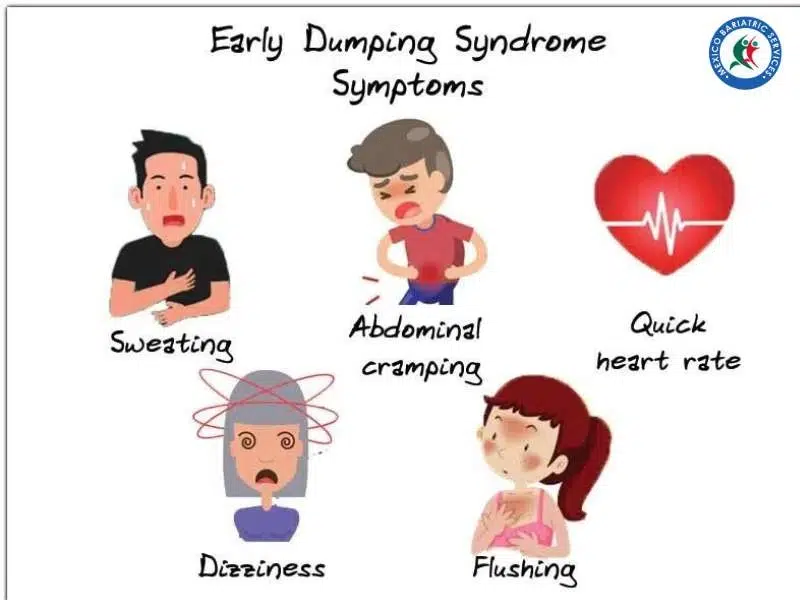Post WLS Dumping Syndrome and Nausea – Causes and Remedies
Medically Reviewed by Katelyn J. Mock, US-Registered Dietician (R.D.)
Post-surgery, the holding capacity of your stomach is altered due to which dairy foods and sugary diets can get dumped rapidly into the small intestine. This phenomenon is referred to as ‘Dumping Syndrome’, or rapid gastric emptying, and can often lead to nausea and vomiting.
Watch your eating habits if you encounter nausea along with any of the following symptoms:
- Stomach cramps
- Fatigue
- Bloating
Causes of Nausea After Dumping Syndrome

Early Dumping Syndrome
- Usually, it takes a few hours for the food to advance from the stomach to the intestine.
- Post-surgery, a part of your stomach is reduced equivalent to a golf ball!
- This results in the food reaching the intestine at a faster pace.
- Sweet foods expand the intestine and additional fluids are released to handle them.
- This results in Nausea/Bloating within 30min of eating.
According to the National Institute of Diabetes and Digestive and Kidney Diseases (NIDDK)[1]“Dumping Syndrome.” National Institute of Diabetes and Digestive and Kidney Diseases, 2013
View in Article , 75% of people suffering from dumping syndrome experience early symptoms.
Late Dumping Syndrome
- Foods rich in sugar raise the blood glucose level.
- Pancreas release insulin to combat this sudden rise.
- The glucose level abnormally drops down, leading to Hypoglycemia (Blood sugar)
- This causes Nausea some 3 hours after a meal is taken.
How is Dumping Syndrome Diagnosed?

Doctors may conduct any or all of the following tests to check if nausea and other symptoms are associated with dumping syndrome. [2]Mayo Clinic Staff. “Dumping syndrome – Diagnosis & Treatment.” Mayo Clinic, 2018,
View in Article
Glucose test
- Hypoglycemia (low blood sugar) is a major symptom of the late Dumping Syndrome
- The doctors measure glucose concentration in blood before giving a glucose solution to the patient
- After drinking the solution, sugar levels are checked at regular intervals (120-180min)
- Low blood sugar levels reveal Dumping syndrome in patients.
Medical assessment
The doctor may also go through your medical history and other symptoms that you may have shown after the bariatric surgery.
Scintigraphy
This test involves placing radioactive material in a bland meal, which when consumed, helps in detecting the rate of gastric emptying through medical imaging.
Endoscopy and X-rays
An endoscope mounted with a camera is placed inside your gastrointestinal tract to study anatomy closely. similarly, X-rays are performed in combination with barium for more prominent images of your tract.
Note that some of these tests may make you feel nauseated for some time. Therefore, do not confuse the mild symptoms with those of dumping syndrome.
Eating Habits to Adopt After Bariatric Surgery

- Put a full stop on candies, honey, sweets, baked foods, or sodas (anything that may contain large amounts of sugar).
- Have 5 smaller meals than the conventional 3 large meals a day.
- Incorporate more protein as it helps to heal your pouch.
- Complex carbohydrates and fiber-rich foods obstruct narrow gastric outflow delaying the absorption of carbohydrates in the small intestine.
- Avoid Dumping food down to avoid Dumping syndrome.
- Drink plenty of clear fluids.
- Follow the 30-minute drinking rule post-bariatric surgery.
- Get your diet plan planned by a bariatric nutritionist
How to Overcome Nausea and Dumping Syndrome?
- Medications – when dietary measures prove futile, your doctor may put you on certain medications that hamper the process of rapid gastric emptying. Alternate Medicines or supplements slow down the progress of digestive contents through the intestines.
As per the NIDDK, octreotide may be administered into the skin for this purpose, with the help of an injection after every four weeks.
Revisionary surgery may be performed either to revise the previous bariatric surgery causing dumping syndrome or to simply end post-operative nausea and vomiting (PONV) symptoms when all other efforts fail.
Nausea postop surgery due to dumping syndrome occurs when the small intestine is deluged with food and fluids beyond its handling capacity. The symptoms of early dumping syndrome slowly fade away on their own after a few months if mindful eating is practiced. Ask your doctor about other possible courses of action.
This Post Addresses
- How do you check for the dumping syndrome?
- How long does gastric dumping syndrome last?
- Treatment for gastric bypass dumping syndrome
- Controlling rapid bowel movement
- Abdominal discomfort and cramps
- Preventing diarrhea after bariatric surgery
References:
- “Dumping Syndrome.” National Institute of Diabetes and Digestive and Kidney Diseases, 2013,
- Mayo Clinic Staff. “Dumping syndrome – Diagnosis & Treatment.” Mayo Clinic, 2018,
{
“@context” : “http://schema.org”,
“@type” : “Article”,
“headline” : “Post WLS Dumping Syndrome and Nausea”,
“author”: “Aranza”,
“image” : “https://www.mexicobariatricservices.com/kb-old/wp-content/uploads/2018/06/Causes-of-Nausea-After-Dumping-Syndrome-1-2.jpg”,
“datePublished”: “2018-09-20”,
“publisher”: {
“@type”: “Organization”,
“name”: “Mexico Bariatric Services”,
“logo”: {
“@type”: “ImageObject”,
“url”: “https://www.mexicobariatricservices.com/wp-content/uploads/2019/08/MBS-Logo-1.png”
}
},
“articleSection” : “How to Overcome Nausea and Dumping Syndrome?”,
“articleBody” :”Post-surgery, the holding capacity of your stomach is altered due to which dairy foods and sugary diets can get dumped rapidly into the small intestine. This phenomenon is referred to as ‘Dumping Syndrome’, or rapid gastric emptying and can often lead to nausea and vomiting.
Nausea postop surgery due to dumping syndrome occurs when the small intestine is deluged with food and fluids beyond its handling capacity. The symptoms of early dumping syndrome slowly fade away on their own after a few months, if mindful eating is practiced. Ask your doctor about other possible courses of action.”,
“url” : “https://www.mexicobariatricservices.com/knowledgebase/debit-cards-mexico/”
}

